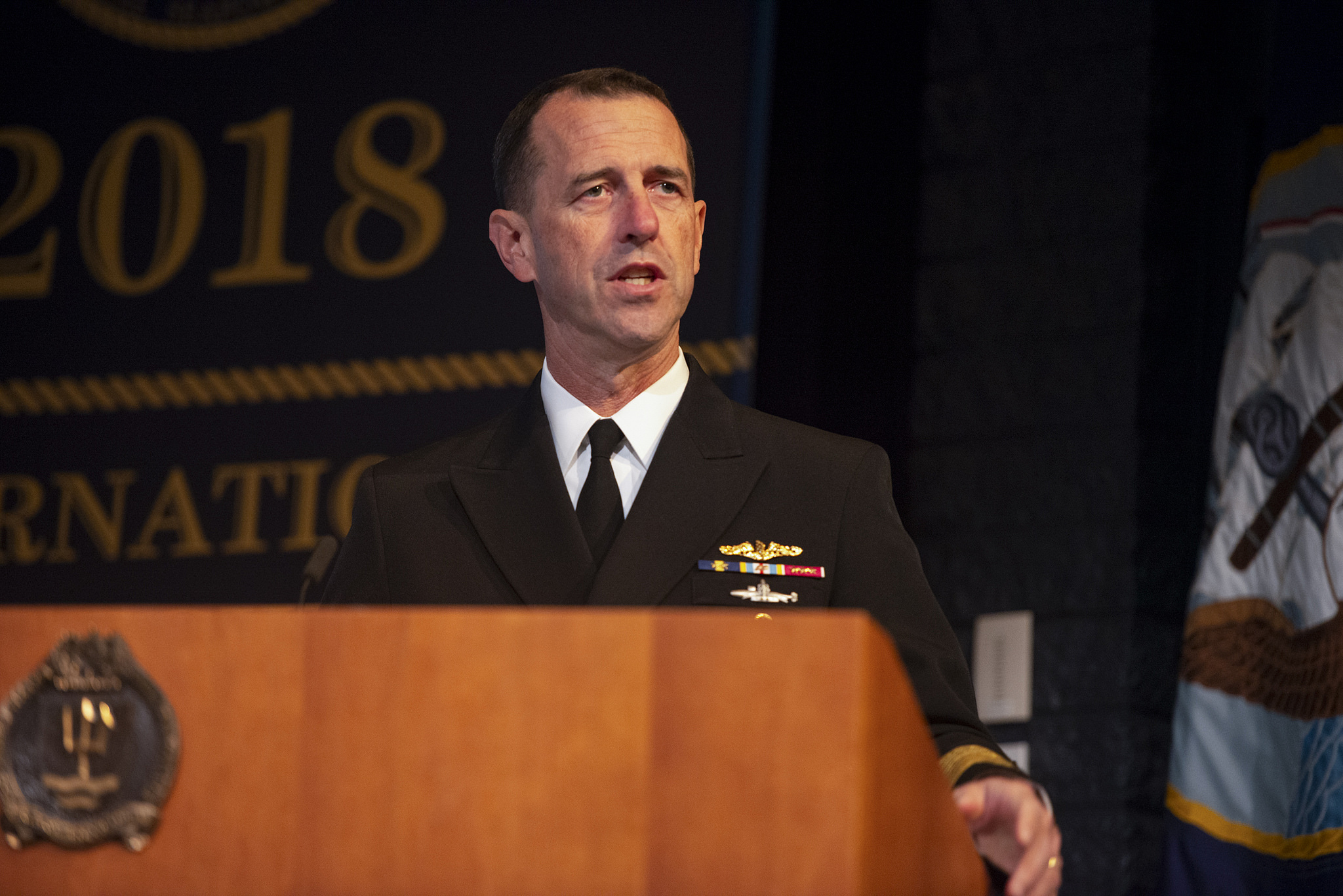Global Leaders Assemble at 23rd International Seapower Symposium

Military leaders from more than 100 nations converged to discuss cooperative strategies for enhancing global security, order, and prosperity at the Chief of Naval Operations’ (CNO) 23rd International Seapower Symposium (ISS) held at U.S. Naval War College (NWC), Sept. 18-21, 2018.
ISS is the world's premier naval gathering, bringing together heads of services to bolster maritime security by discussing common challenges and shared opportunities.
CNO Adm. John Richardson and NWC President Rear Adm. Jeffrey Harley co-hosted the symposium, which included more than 90 heads of service. Keynote speakers included U.S. Secretary of Defense James Mattis; Secretary of the Navy Richard V. Spencer; retired Adm. Timothy J. Keating; and Peter W. Singer, strategist and senior fellow at New America.
"We seek a true partnership based upon the concept of shared risks producing shared rewards,” said Spencer. “A partnership in which no single nation is the expert, and the ability to lead resides within all of us. When we work together this way, we can produce an equation where 1+1 = 3, and everyone benefits."
Panelists and speakers of ISS frequently expressed a shared goal to improve interoperability among the world’s navies, based on the principle that “we are stronger together.” Working together in exercises, joint deployments, personnel exchanges, attending each other’s schools, and gathering at events like ISS enhances mutual security, protects the rules-based order that benefits all nations, and contributes to global prosperity.
In a crisis, the ability to quickly assemble relies on these pre-existing bonds between navies as nations embark on missions that matter to security, order and economic prosperity.
"Every day, our allies and partners join us in defending freedom, deterring war, and maintaining the rules which underwrite a free and open international order," said Spencer.
Oceans that once were the physical and psychological barriers that kept nations apart are now the maritime superhighways that bring nations together. Strong maritime forces are uniquely suited to help manage the increasing pace and complexity of change, by virtue of the uniquely productive relationships that are possible, and by virtue of strong history and advocacy for behavior in accordance with a well understood and agreed-to set of rules.
“ISS-23 is a manifestation of this desire to strengthen the bonds of trust and confidence among partners, and to explore new opportunities on which we can collaborate and from which we can learn,” said Richardson. “Make no mistake, this desire to sail together in support of our fellow citizens -- regardless of the winds, waves, and weather around us -- is the current that has drawn us here to Newport."
“The more we cooperate, the better we would be able to provide presence globally and around the clock,” said Keating, one of the keynote speakers. He continued his address by saying secure communication is essential to effective maritime strategy.Panel discussions, presentations and one-on-one conversations by the delegates concerned common issues of the maritime domain such as combined operations, communication at sea, drug trafficking, piracy, smuggling, natural disaster relief, and methods of securing free and open ocean spaces.
During his remarks, Singer suggested that in order to maintain peace, flexibility, and consciousness, it’s necessary to understand the changes occurring on the water and in the world. It is paramount to the future of not just maritime warfare but also to national policy.
Indian navy Chief of the Naval Staff and Chairman of the Chiefs of Staff Committee Adm. Sunil Lanba recommended during a panel on defense of the maritime commons “mutual trust” as an important attribute that should be included in the foundation of all present and future collaboration.
Sally Yozell, environmental security director for the Stimson Center, illustrated the impact of illicit networks on both natural resources and larger geopolitical relationships.
"The full extent of illegal, unregulated and unreported (IUU) fishing goes far beyond the environment,” said Yozell. “It threatens the economic and food security of communities dependent on fisheries. It has even been linked to increasing geopolitical tensions in the South China Sea, piracy off the Horn of Africa, and the drug trade in Latin America. IUU fishing often uses the same networks as other transnational organized crime who are engaged in selling black market goods. We need to take a regional approach and to share intelligence across navies and coast guards to combat these illicit networks."
Four U.S. ships were present for ISS: the amphibious transport dock USS New York (LPD-21), the guided-missile destroyer USS Lassen (DDG-82), the expeditionary fast transport USNS City of Bismarck (T-EPF-9), and the U.S. Coast Guard Cutter Lawrence Lawson (WPC 1120). Delegates and their spouses had the opportunity to tour the ships, fostering good relationships and shared experiences for the mariners in attendance.
During his remarks, the CNO explained the importance and necessity behind maritime collaboration among allies and partners which secures the vital sea lanes that underpin global commerce.
The biennial ISS was first held in 1969 in Newport and was designed to allow naval leaders from around the world to meet and discuss common issues they faced, how to address these issues, and ultimately find solutions for them. Previous years’ symposiums have resulted in enhanced cooperation in countering piracy, providing disaster relief and humanitarian assistance, coordinating search and rescue at sea (including submarine rescue), and countering arms/drug/human trafficking and fishery/pollution violations.
Established in 1884, NWC is the oldest institution of its kind in the world. More than 50,000 students have graduated since its first class of nine students in 1885. Approximately 300 of today’s active-duty admirals, generals and senior executive service leaders are alumni.
